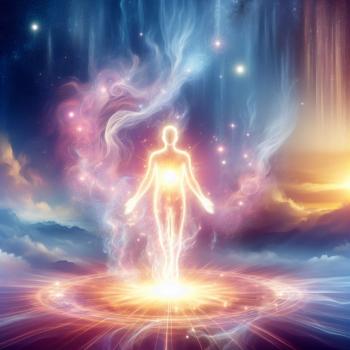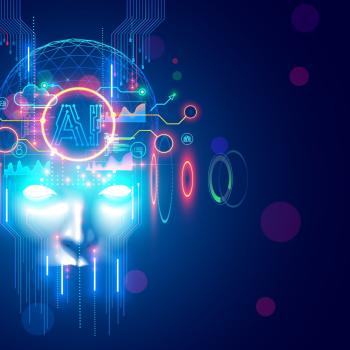In the previous post in this series, I argued there are three fundamental aspects of reality that the Bible presupposes as true. The first of these unchangeable features of God’s world is the reality of hierarchical structures. Human beings cannot avoid hierarchical structures or undo the authoritative roles that constitute them. In fact, it is better to say that because there are indispensable relations of authority, hierarchical structures exist. We shouldn’t put the cart before the horse.
The reasons for this is simple: hierarchy is baked into the fabric of the cosmos. This feature of the world is itself a reflection of the inner operations of the Triune God. It is God’s essence that is the source of all being and the archetype for all creation. But before moving on to the next feature in this series, recapturing a sense of intrinsic value, allow me a short theological interlude.
A Short Interlude on Theology Proper
It is very difficult to make one-to-one comparisons between the immanent, eternal life of the Triune God and particular realities in time and space. Nevertheless, those features of our world we acknowledge as fixed and universal are best understood in light of God’s eternal being. Contingent things are the way they are because of the eternal God Who is. So while we can accept the simple statement: “hierarchy is a fundamental aspect of reality because it exists in the Trinity itself,” we dare not say much beyond that.
The same goes, for example, for God’s eternal love. We know that love is fundamental and indispensable to our world because “God is love.” But we cannot read from the immanent love of the three Persons of the Trinity exactly what love looks like for us. We only know that Their Love makes love the number one thing for us. To know more precisely how we should love, we must look at God’s economy.
God’s economy is His operations in the world. Most central to God’s economy, and most central to understanding the love we are to exemplify, is the life and the death of Jesus Christ. Contemplating the immanent Trinity–God apart or prior to His Creation in all eternity–tells us that Love is central, but little more. To know how Love is central, we must look at the economic Trinity–God revealed to us in time and space through His trinitarian activity.
Thus, to try to spell out what hierarchy should look like based on our understanding of the immanent Trinity alone could lead to all kinds of error. If we push too far in one direction, for example, we wind up with some kind of ontological inequality, an inequality that might end in repeating the greatest of all early heresies: Arianism. Moreover, if the parallel is drawn, one could wind up seeing one class of human beings as ontologically superior to another (e.g., men to women).
Alternatively, if you neglect any kind of hierarchical relation (not relationship), then you could push too far into something like social trinitarianism; making each person of the Trinity into a unique individual, complete with his (or her) own center of conscious, his (or her) own thoughts, feelings, favorite flavor of ice cream, episode of Star Wars, etc. Again, if the parallel is drawn here, then we have no authority structure whatsoever and everyone becomes a CEO unto him or herself.
Therefore, given our finite minds and limited data set, we must tread with great caution. From the Scriptures, we might say that given the eternal generation of the Son from the Father, this procession grounds, in some way, the fact that we need hierarchies down here. But to try to read the inner, and ultimately ineffable, nature of God as some kind of step-by-step manual for constructing the healthy hierarchies we need will simply not work. It just isn’t that easy. As the inimitable Fred Sanders has pointed out, talking about the Trinity is itself a very tricky business.
And so as a truly amateur theologian, I will leave anything else I might say unsaid at this point. And, if Sanders ever reads this blog, then I will know where to correct what has already been written. For now, there is another fundamental feature of God’s world we need to reassert, lest we continue our fall into social chaos and do harm to each other.
The Woeful History of Humankind
One could open this discussion about recapturing a certain perspective about value by considering the worth of human beings. We could point out that there is something, call it “intrinsic value” or “inherent dignity” that we know exists, because we know what a human person is. We might think that that is all it takes; a simple recognition that every human life matters in virtue of it just being human.
Unfortunately, this is not so easy to say given the facts of history. The notion that human rights are grounded in some innate feature of each and every human being may not be new, per se, but it certainly has never been ubiquitously held. It is by no means obvious, given the historical record, that human being have thought that human beings have such inherent worth.
In fact it appears quite the opposite. Human beings have often seen human beings as fairly dispensable things. The history of human value, like the history of human hierarchies, is one that has treated some humans as instruments in the hands of others– as tools for those who wield power. Rights, or what is considered right, for most of human history has simply been the provenance of the mighty. Justice, as Plato has Thrasymacus claim in The Republic, “is the advantage of the strong.”
Slavery is the most obvious example of this. Whether it was the slavery the Pharaohs subjected the ancient Israelites to, or that of the Roman Empire and those they conquered, or those African warlords of the 17th and 18th centuries who forced other Africans to endure chattel slavery at the hands of Europeans colonialists, the treatment of human beings as instruments has been with mankind from the start. And so the need to recapture, or better said, continue to fight for, the intrinsic value of human persons is as urgent as ever. This biblical truth is never a foregone conclusion for sinful creatures like us.
Intrinsic Value And The Image of God
The single definitive teaching that altered western civilization at its most fundamental level was the theological doctrine of the Imago Dei, or man as image-bearer of God. This doctrine, derived directly from the Old and New Testament, recognized that man is God’s special creation. God has endowed man with various powers not shared with lower forms of life, powers that invest man with moral agency and accountability.
These powers of man, however, are merely manifestations of something more fundamental. The image of God in man cannot be reduced to only powers or capacities. It is not only man’s rationality or his moral agency that invests him with intrinsic value. Nor can the image be reduced to one or more of his actions, like creating art or pursuing scientific knowledge. The image is man’s nature itself; the divine stamp is simply upon all human beings. However, in virtue of sin, this nature has been defiled and, in being defiled, the sense of man possessing intrinsic value has been lost.
This biblical teaching, that man was made directly by a personal God and personally ordained to be God’s standard-bearer in the world (in God’s “cosmic temple”), turned the ancient view of man on its head and still challenges contemporary scientific views of man as a mere evolutionary accident. This recognition of the human person as caused and commissioned by God undermined the Greco-Roman view of man subject to Fate, and undermines today’s western view of man as byproduct of physical chance and social determinism.
The Fallout of the Defiled Image
I already mentioned some historical examples, quite glaring ones, where the divine image of God in man had been suppressed. Today we are at a horrible crossroads in our American culture. On the one hand, we seek to elevate every class of people that claims to be oppressed, protecting them with ever more complex laws– an action which appears motivated by the right kind of moral impulse. Yet, on the other hand, we easily view each other, and many of our most intimate activities, as purely instrumental, dull links in a monotonous chain meant to always lead to some other good. Nothing in itself seems of great or inestimable value, nothing in itself is treated as infinitely mysterious, let alone sacred.
In an equally incisive and obscure text on the existentialism of the mid 20th-century, Oxford philosopher F.H. Heinemann penned these words:
Human societies are today secularized to a degree unheard of in former times. Some of them are indifferent and others hostile to religion, some ‘humanistic’, others openly atheistic. There are millions of people to whom nothing is sacred. But why is it that nations soaked in humanism, which have achieved a high standard of material well-being, are nevertheless unhappy? Can a society which has completely lost the sense of the holy reach a state of relevant perfection?
F.H. Heinemann, Existentialism and the Modern Predicament
Heinemann wrote these words in 1953. How far we have come since then in our dismissal of the sacred and our rejection of the holy. As I have written about here, here and here, the loss of a sense of intrinsic value, not only of human persons, but also of our activities: like the creation of good art, marital intimacy or the congregating together in church, is itself one of the deepest rejections of God’s creation and one of the greatest acts of corporate suicide. It is, as Heinemann pointed out 75 years ago, a fundamental source of our unhappiness.
Anthony Esolen writing for Touchstone, the best Christian publication of our day, elaborates on this problem of utility in modern society:
We do not have beautiful things, because we do not want them enough…We do not have beautiful things because we have been taught to value things and even persons mainly for their utility….
Our trouble now is that we do not define our worth according to reality, which we find admirably expressed in Scripture, when God says, “Let us make man in our image.” It is blasphemous or absurd to ask, “What is it for, to what use may it be put, this being made in the image of God?” But we define or measure our worth as if we were tools or machines, gears in an economic or social rig.
Esolen, “The Ugly and the Good: Why We No Longer But Still Could Have Beautiful Things”
The inability to value things, especially people, for what they are in themselves, and not for what they can do or bring or lead to, is why we live in such an ugly culture. It is why woman choose to abort their babies, because if they think the baby cannot bring them happiness, or will produce too much pain, then its value is reduced to nearly nothing. It is why celebrities allow themselves to be treated as instruments of sexual desire, instead of demanding to be seen as sons and daughters of the living God, already stamped with divine beauty and worth. It is why teenagers mimic those celebrities and, when they have been used one too many times, kill themselves or others.
Until we learn again to see that God created His world “good,” then we will continue to misuse and abuse those things which from the beginning were meant only for love, and, conversely, love those things that were meant only for use.














